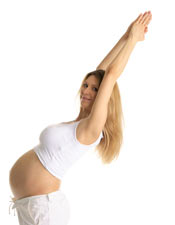Exercise in Pregnancy
If you want to find out about exercise in pregnancy and what pregnant exercises are best for you, then NetFit.co.uk can help. It is usually safe to workout during a large proportion of your pregnancy, but always check with a doctor first.
 Here at netfit, we wanted to provide some advice on exercise in pregnancy and training when you're pregnant. We can provide you with some pregnancy exercises that can help you to stay in shape and keep fit.
Here at netfit, we wanted to provide some advice on exercise in pregnancy and training when you're pregnant. We can provide you with some pregnancy exercises that can help you to stay in shape and keep fit.
Always visit your GP before you do any exercise, but our pregnant training is simple and fun to do.
Research has shown there are a number of benefits from exercising whilst you're pregnant:
Greater ability to handle the discomforts of pregnancy and labour
-
Easier to get back into shape and regain you're normal weight after pregnancy
-
Fewer caesarian surgeries, and less likely to require epidural analgesia
-
Faster labor, with less need for induction with pitocin
-
A more positive, healthier feeling pregnancy
With exercise improving your muscle tone, strength and endurance, woman who train regularly throughout their pregnancy are greater prepared for the physical stress that carrying a baby and labor produce.
Sometimes exercise during pregnancy can be harmful for either the mom - to - be, baby or both, any woman who wants to exercise during her pregnancy should get her doctor's / midwife's approval first.
GUIDELINES
Certain medical conditions might need special attention or limited exercise.
-
Pre term rupture of membranes.
-
Pregnancy induced hypertension (high blood pressure).
-
Persistent second or third trimester bleeding.
-
History of several miscarriages or premature labour.
-
Poor fetal growth.
-
History of Incompetent Cervix.
-
Muscle or joint problems.
-
Multiple birth pregnancy.
-
Heart Disease
- Low Back Pain / Sciatica
After you have the all clear from your doctor to exercise, the following guidelines will hopefully help prepare you for your pregnancy.
-
Drink plenty of fluids, before, during and after any exercise; be careful not to get overheated especially during your first trimester and in warm humid conditions. Exercise causes sweat, the bodies natural way of cooling down, remember your baby has no way to cool down, so drinking fluid is vital, even during swimming sessions, when you obviously don't realize that you're sweating.
-
Always include a warm-up and cool down during your exercise, with gentle stretching, and relaxation breathing techniques.
-
For woman who trained prior to pregnancy, regular exercise is preferable to sporadic exercise, ideally 3 times per week. Varied research has suggested that woman who have not exercised previously should not begin to after 26 weeks gestation due to the development of the placenta.
-
Avoid any form of exercise that may cause you to lose your balance, especially in the third trimester. Sports with a high risk of hard falls, such as skiing or basketball should be off limits. Likewise any walking or outdoor activity should be performed on flat uneven ground.
-
Dress wearing loose fitting clothing, with a good support bra, and comfortable non slip supportive shoes.
-
Don't exercise flat on your back in the supine position after your first trimester, as your uterus would have grown out of your pelvis, and the weight of it, when you are on your back reduces your blood and oxygen flow to your baby due to depressing the vena cava.
-
During aerobic exercise, you will have less oxygen available for yourself, so lower the intensity of your normal routine. Monitor your heart rate regularly to avoid exercising to exhaustion and slow down if you can't hold a conversation comfortably.
-
Stop exercising immediately if you have any of the following; vaginal bleeding or fluid leaking, contractions, light-headed or feeling faint, shortness of breath, dizziness and nauseated.
-
Avoid bouncing and jerking exercises, and deep knee bends, as your joints are more prone to injury because of the pregnancy hormone relaxin, which softens ligaments and tendons to allow your bones to spread for the birth of your baby.
- Your metabolism speeds up during pregnancy so remember to eat a well balanced diet with an additional 300 calories a day.
As well as the specific fitness exercises that target pregnancy, we also offer a range of training programs as well as other workouts that you can do at home anytime.
Why not go to the next page to see what exercise advice we have for you :